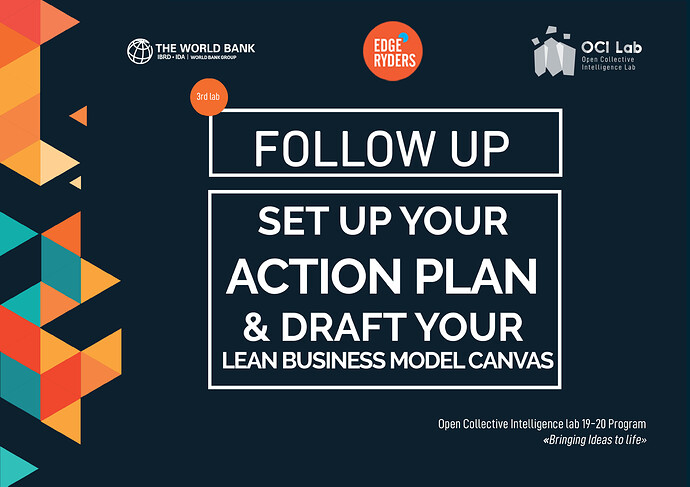On Monday the 30th of December, OCI LAB incubator hosted the third online lab named: “Set up your action plan and draft your Lean Business Model Canvas” with the assistance of OCI Lab Mentor Dr.Wajdi Ben Rejeb, an associate professor of management and entrepreneurship at the university of Carthage.
Throughout the lab, @Wajdibr gave a detailed presentation and guided the project leaders to establish an action plan and make a Lean Business Model Canvas draft.
Around 4 p.m, the participants took 10 minutes of their time to do the check-in via the zoom conference room by writing their full names, countries and projects in the chat channel.
During this lab, were present the project leaders listed below:
@HadeerGhareeb, Egypt, Didi-Asks
khadija Ouabdelmoumene, Morocco, @Alphawomen
@salaheddine Ogontayo, Tunisia, Identity Co.
@sirine_bouslama, Tunisia, Datascience Academy
@ayari.taha , Tunisia, Artificial intelligence for alzheimer’s and dementia predicition
@MohsenMahdaoui ,Tunisia,PaillEco
@saif.eddine.laalej Morocco, Zelij Invent
@mohamed75, Egypt, colex
@HIBA Sedouane, Morocco, diyafa
After checking with the attendees to see if they had any questions concerning the previous lab , the moderator @khouloud.ouesleti shared the lab resources and stated some important remarks concerning the One To One Lab, insisting on the necessity of creating a separate post on the Edgeryders platform so that the mentor can check the evolution of their idea and the judge committee can evaluate better the impact of the labs on their business idea.
Afterwards, Mr Wajdi started displaying the objectives of the third online lab, then he moved to pointing the difference between a business model canvas and Lean canvas. In fact, the lean canvas is a different adaptation from the original business model by making the canvas actionable. While keeping the same space, 4 blocks were removed from the original model, to make room for 4 new blocks, that are respectively: Problem, solution, key metrics and Unfair advantage. Then he commenced to describe each bloc and how to fill it according to a certain order.
Each part of the canvas was well explained and illustrated with examples.
As a matter of fact, the lean canvas’ blocs are reunited into two parts: the product and the market part.
Following the description of the blocs in each part, there was a break in which questions from the project leaders were asked, thus, certain ambiguities regarding their projects were clarified.
Towards the end of the lab, in order to process the lean canvas, a full detailed example of the Uber London lean canvas was displayed to perceive a real example and understand the concept.
At last, @khouloud.ouesleti shared the offline tasks while indicating that they need to deliver them in time and respect the deadlines which is the 10th of January 2020. Mainly, the tasks consists of preparing the lean business canvas, the action plan and their project skills matrix. She has also communicated an advice regarding the human resources needed concerning each project, in order for the OCI lab team to match between the project leaders and the potential contributor who will eventually help them with the prototyping process.
Please know that the labs are open to everyone. If you have a social ecological business idea don’t hesitate to join our next online labs and webinars. Also please check the follow up posts of lab 1 and lab 2 for further information.*
